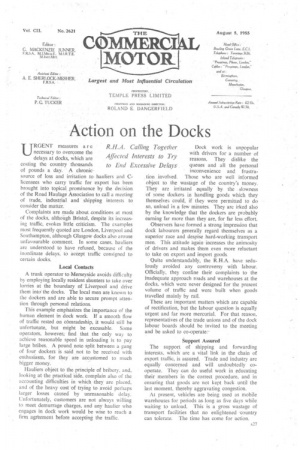Action on the Docks
Page 29

If you've noticed an error in this article please click here to report it so we can fix it.
R.H.A. Calling Together Affected Interests to Try to End Excessive Delays URGENT measures a r e necessary to overcome the delays at docks, which are costing the country thousands of pounds a day. • A chronic-source of loss and irritation to hauliers and Clicensees who carry traffic for export has been brought into topical ,prominence by the decision of the Road Haulage Association to call a meeting of trade, industrial and shipping interests to consider the =air.
Complaints are made about conditions at most of the docks, although Bristol, despite its increasing traffic, evokes little criticism. The examples most frequently quoted are London, Liverpool and Southampton, although Glasgow docks also arouse unfavourable comment. In some cases, hauliers are understood to have .refused, because of the inordinate delays, to accept traffic consigned to certain docks.
Local Contacts A trunk operator to Merseyside avoids difficulty by employing locally resident shunters to take over lorries at the boundary of Liverpool and drive them into' the docks. The local men are known to the dockers and are able to secure prompt attention through personal relations.
This example emphasizes the importance of the human element in dock work. If a smooth flow of traffic rested on dunraleship, it would still be unfortunate, but might be excusable. Some operators, however; find that the only way to achieve reasonable speed in unloading is to pay large bribes. A pound note split between a gang of four dockers is -said not to be received with enthusiasm, for they are accustomed to much bigger money.
Hauliers object to the principle of bribery, and, looking at the practical side, complain also of the accounting difficulties in which they are placed, and of the heavy cost of trying to avoid perhaps larger losses caused by unreasonable delay. Unfortunately, customers are not always willing to meet demurrage charges, and any haulier who engages in dock work would be wise to reach a firm agreement before accepting the traffic. Dock work is unpopular with drivers for a number of reasons. They dislike the queues and all the personal inconvenience and frustration involved. Those who are well informed object to the wastage of the country's Money. They are irritated equally by the slowness of some dockers in handling goods which they themselves could, if they were permitted to do so, unload in a few minutes. They are irked also by the knowledge that the dockers are probably earning far more than they are, for far less effort.
Observers have formed a strong impression that dock labourers generally regard themselves as a superior race and despise hard-working transport men. This attitude again increases the animosity of drivers and makes them even more reluctant to take on export and import goods.
Quite understandably, the R.H.A. have sedulously avoided any controversy with labour. Officially, they confine their complaints to the inadequate approach roads and warehouses at the docks, which were never designed for the present volume of traffic and were built when goods travelled mainly by rail.
These are important matters which are capable of rectification, but the labour question is equally urgent and far more mercurial. For that reason, representatives of the trade unions and of the dock labour boards should be invited to the meeting and be asked to co-operate:.
Support Assured The support of shipping and forwarding interests, which are a vital link in the chain of export traffic, is assured. Trade and industry are equally concerned and will undoubtedly cooperate. They can do useful work in educating their members in the correct procedure, and in ensuring that goods are not kept back until the last moment, thereby aggravating congestion.
At present, vehicles are being used as mobile warehouses for periods as long as five days while waiting to unload. This is a gross wastage of transport facilities that no enlightened country can tolerate. The time has come for action.




































































































